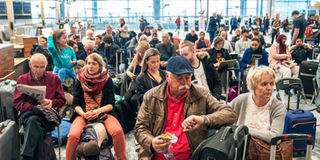SAS pilot strike leaves 72,000 passengers stranded

Travellers wait during a strike of Scandinavian Airlines' (SAS) pilots to contest wages and working hours on April 26, 2019 at the Gardamoen Airport in Oslo, Norway. AFP PHOTO
What you need to know:
- In the first quarter of 2019, the airline widened its losses, impacted by negative exchange effects and high fuel prices.
- It posted a net loss of 469 million kronor, compared to 249 million a year earlier, but forecast a full-year profit.
Danish bank Sydbank on Friday predicted the strike would cost SAS 60 to 80 million kronor per day.
Pilots at Scandinavian carrier SAS walked off the job in Sweden, Denmark and Norway on Friday, stranding more than 72,000 travellers as 673 flights were cancelled, the airline said.
A total of 1,409 pilots were on strike, affecting domestic, European and long-haul flights, SAS said, predicting that 170,000 passengers would be affected through Sunday.
The Swedish Air Line Pilots Association, which initiated the strike, said months of negotiations had failed to find a solution to pilots' "deteriorating work conditions, unpredictable work schedules and job insecurity".
The Swedish Confederation of Transport Enterprises meanwhile said it could not accept the 13-percent wage increase demanded by the pilots, given their "already high average wage of 93,000 kronor (8,766 euros, $9,769) a month".
The pilots' association said work schedules, and not wages, were the main focus of the negotiations, as most SAS pilots to have work at variable times and days.
"Many SAS pilots have no control over when and how long they have to work. In a worst case scenario, they risk having to work seven weekends in a row," the pilots' association said in a statement.
"Everyone who has a family life can imagine how difficult it is to not know when you have to work," SAS' Swedish union representative at the pilots' association, Wilhelm Tersmeden, said.
'Hope we'll be rebooked'
SAS contacted most passengers before the cancellations to warn them of the strike and offered to rebook them at no extra cost.
On Friday, many travellers turned up at Stockholm's Arlanda airport in the hopes of getting on other flights.
Elsa Lundberg, 20, and Christoffer Weil, 22, had been due to travel to Scotland for a hiking trip with their college class.
"This trip is the biggest thing this semester," Weil told news agency TT.
"We hope that we'll be rebooked on another flight. But we're a big group and it's unlikely everyone would be able to get on the same flight," Lundberg said.

Airplanes of the Scandinavian Airlines' SAS company park on ground at the Gardamoen Airport during a strike of pilots to contest wages and working hours on April 26, 2019 in Oslo, Norway. AFP PHOTO
"They're offering free coffee at Arlanda now, so that's at least a good thing," she said.
Swedish pastor Ronny Nygren, who was scheduled to take his church's youth group to Rome on Friday and was hoping they would be rebooked on another flight, said he had mixed feelings about the strike.
"It's good that they're fighting for their work conditions. But then you have to think about the 13 percent, compared to other Swedes' salaries," he told TT.
The strike affected about 70 percent of SAS flights, with the remainder operated by partner airlines.
SAS has implemented repeated savings programmes in recent years to improve its profitability, after teetering on the brink of bankruptcy in 2012.
In the first quarter of 2019, the airline widened its losses, impacted by negative exchange effects and high fuel prices.
It posted a net loss of 469 million kronor, compared to 249 million a year earlier, but forecast a full-year profit.
Danish bank Sydbank on Friday predicted the strike would cost SAS 60 to 80 million kronor per day.
A protracted strike, and the added pressure of meeting the pilots' demands, could put SAS in a precarious financial position, eating away at much of the profit expected this year, Sydbank analyst Jacob Pedersen told TT.
"That could jeopardise the airline's future," Pedersen said.
The SAS share price was down by 5.6 percent in mid-morning trading, while Stockholm's OMX 30 index was down 0.3 percent.




